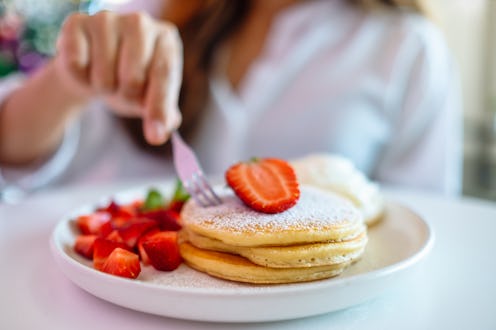Life
Dietitians Explain Why Comfort Food Just Makes Sense Right Now

As social distancing drags on, many of us are reaching for the tater tots, or the strawberry-banana smoothie, or the mac and cheese — or whatever your comfort food of choice is. When you're eating all of your meals at home — or cooking is the main source of structure to a day filled with bad news — comfort food just makes sense.
“When things feel out of control, it’s not uncommon for someone to turn to comfort food in order to feel in control of something,” Jacqueline Stone MS, RD, CEDRD, LD/N, a registered dietitian, tells Bustle. “Comfort foods also help satisfy emotions like sadness, anxiety, or depression, which we know have increased during this difficult time.”
In other words: We can’t control much right now, but we can control what boxed macaroni and cheese tastes like.
According to a 2017 review published in the International Journal of Gastronomy and Food Science, we associate comfort food with good memories and strong relationships. For example, if your mom always gave you chicken soup when you were sick, then you’ll associate it with safety, health, and love.
But does eating a peanut butter and jelly sandwich with the crusts cut off actually make you feel good, emotionally? Despite the fact that most people would say anecdotally that it does, the science just isn’t there, according to the same scientific review.
“Some science has shown that upon eating comfort foods, the brain releases the feel-good hormone known as dopamine,” Stone says. “That doesn’t mean these foods are addicting, it just means that for a temporary moment, eating these foods may lead to feeling happier.”
Brenna O’Malley, a registered dietitian and founder of The Wellful, tells Bustle that because “comfort food” is usually associated with foods that are high in sugars and fats, people sometimes demonize or feel guilty about them.
“[Eating comfort foods] is one of your many coping mechanisms, and that’s OK,” O’Malley says. “With any type of coping mechanism and anything we’re using for comfort, we just want to have more than one. It’s OK to use food as a way to cope, but there are other ways to cope, too.”
If your use of this coping mechanism doesn't feel good to you, O’Malley suggests brainstorming some other things that are also comforting. Maybe it’s taking a walk, listening to a podcast, calling a friend, or doing something creative. And if you're really not happy with your relationship with food right now, you might also want to consider reaching out for support. In those moments, try checking in with yourself about how you’re feeling and what you actually need in the moment.
"If it’s food, great!" O'Malley says. "And if it’s not, maybe take that moment to actively choose something else. Know that eating is a conscious choice and not something you have to feel guilty about,” O’Malley says. “It’s something you can actively choose or choose not to do."
Experts:
Brenna O’Malley, RD
Jacqueline Stone, MS, RD, CEDRD, LD/N
Studies cited:
Spence, C. (2017). Comfort food: A review. International Journal of Gastronomy and Food Science, 9, 105–109. doi: 10.1016/j.ijgfs.2017.07.001
This article was originally published on